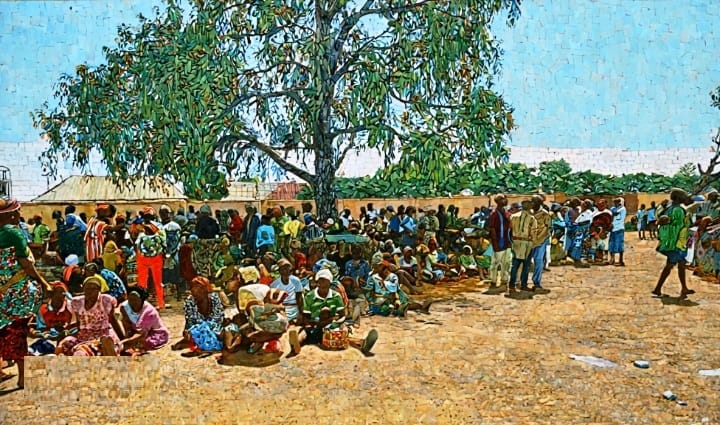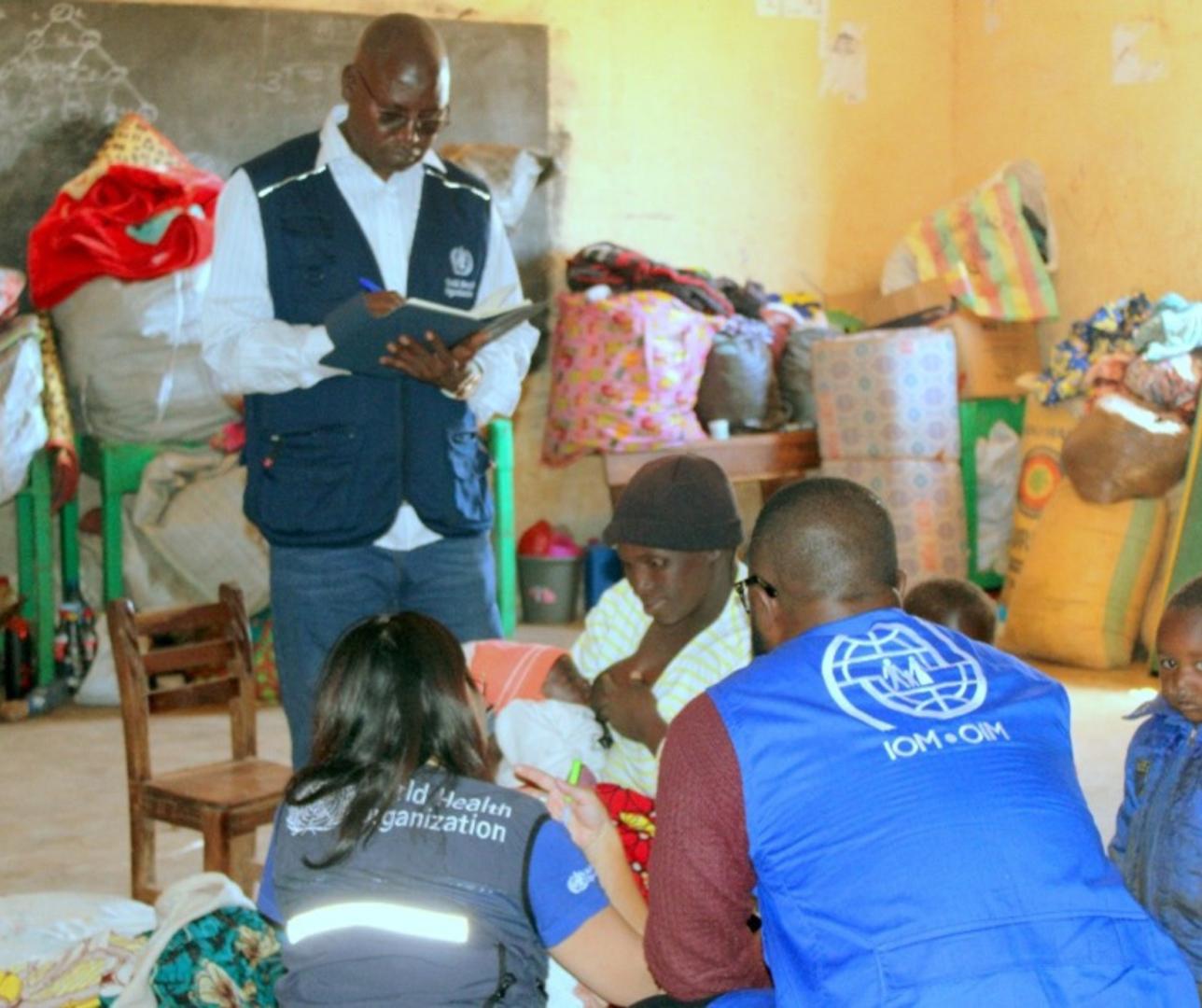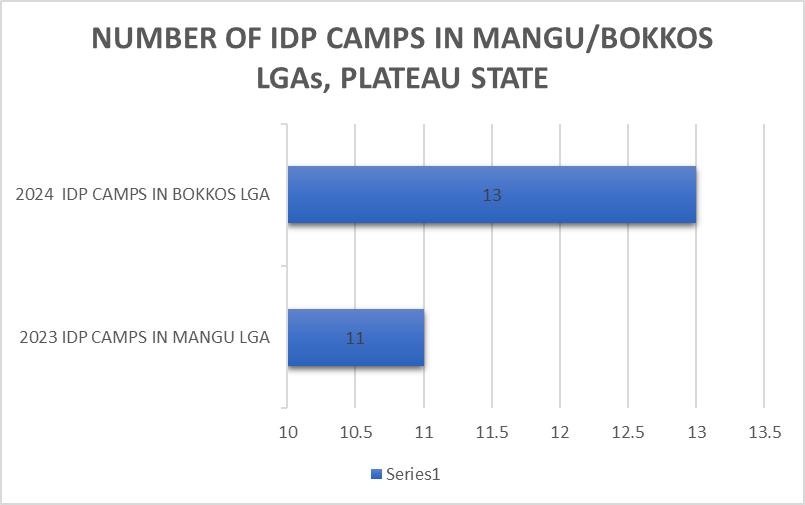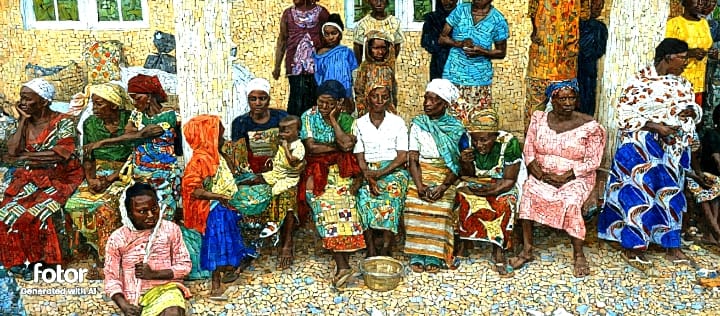Groundbreaking Workshop on AI and Technology-Facilitated Gender-Based Violence at AWiM24
Trending
Friday May 23, 2025
Trending

IDP camp in Bungha, Mangu LGA. Photo Credit: Marie-Therese Nanlon
At about 5 pm on the eve of Christmas in 2023, Liatu, a 40-year-old mother of five from the Tahore community, Bokkos local government area of Plateau State, North-central Nigeria, was startled by the sounds of gunshots while she was cooking for her family.
Armed men had simultaneously invaded her community, and 27 others in the local government area of the State. When the dust eventually settled, more than 200 people were killed in the affected communities, and about 1,000 houses burnt.
Liatu made it an internally displaced persons (IDP) camp in Bokkos town the next day, meeting thousands of others who also fled their communities. Available space was tight, but home until further notice. They gathered in groups narrating their experiences and counting their losses.
However, there seems to be some discrepancies in the figures published by the state and those released by a United Nations Children’s Fund (UNICEF) report in June 2024. The report said that, on 24 December 2023, heightened tensions between farmers and herders resulted in a series of attacks against civilians in Plateau State in the North-Centrall region, killing 865 people including 160 children
International Organisation for Migration, (IOM), documented that 215 people got injured, and 15,313 individuals were displaced to at least seven IDP camps and numerous host communities in Bokkos LGA of Plateau State and Dass, Bauchi, Toro, Tafawa Balewa LGAs in Bauchi State, and that those who fled to Bauchi State, North- East Nigeria, all hailed from Mangu LGA…”
The Plateau State Commissioner for Information and Communication, Musa Ashoms, has rejected this report saying the information given by UNICEF does not exist. “Plateau people are not happy staying in camps, it is not in our records that we have IDPs in Bauchi State. Some people try to make political capital out of unfortunate incidents but as a State, we have the number of displaced persons and none was captured from Bauchi,” said Ashoms.
According to official reports by the State and Federal Governments, 150 people were killed by the gunmen and more than 10,000 people were displaced by the attacks. Ashoms insists that no data shows that people stayed or are staying in an IDP camp in Bauchi State
The Commissioner said many survivors had moved out of the camps through the efforts of the State Government to take them back home, some, especially the women and girls, have endured sexual exploitation by their supposed helpers to meet basic needs.
Oftentimes these women and girls living in IDP camps complain about sexual harassment. Those who are bold enough to speak up, do so, while others just endure the pain and torture in silence
Evelyn, for instance, is a widow from Kombili, Mangu local government area of the State whose village was also attacked in April 2023.Finding herself and her children in the crowded camp at the Pilot Primary School, Bungha, Mangu local government area, unsettled her mental health. She says getting enough food in the camp to feed her children was demanding.
What is the government doing to protect women from the hands of sexual predators and abusers especially in IDP camps?
Aishatu Abdulmumin Ibrahim, a mental and emotional health Educator whose organisation volunteers at IDP camps in Borno State, North-east Nigeria, and other states in the northern part of the country, explained that most IDP camps have the police and military personnel deployed by the government to provide protection and ensure law and order in the camps.
According to Aishatu, the Violence Against Persons Prohibition (VAPP) Act exists solely to provide legal recourse for victims of sexual violence, although the implementation remains a big challenge in the country.
In addition to the VAPP act, “United Nations agencies like the UNFPA and UNICEF run programs aimed at preventing sexual violence and providing psychosocial support to survivors of sexual violence in IDP camps’, Aishatu said.

Mother who gave birth to a baby at IDP camp in Mangu interacting with WHO and IOM officials during an assessment of the IDP camp. Photo Credit; W.H.O. Nigeria
Human rights organisations and Civil society groups, such as the International Rescue Committee (IRC) and Médecins Sans Frontières (MSF), also provide medical care, legal assistance, and advocacy for women’s rights. If all these provisions have been made available for the women and girls, why are there still reports of molestation and violence within the Camps?
Editor’s Note: The names of the survivors have been altered in this report for their security.
Ayuku Pwaspo, is a journalist who leads the Plateau State Council of the Nigeria Union of Journalists. He explained that conflicts usually come with complex situations, complex emergencies where people are forced to leave their homes to internally displaced persons camp most times in schools, religious places, within government institutions. Pwaspo narrated that in Plateau State, there are a few instances where they had tents for IDPs to stay but the camps are usually overpopulated. ‘’Some of the major challenges that IDPs face are food, water, sanitary conditions, health services’, he says.
Pwaspo has called on governments, civil society organisations, faith-based organisations, and camp managers to look at what is happening around the camps. He emphasised that a lot of times even when they receive support, people divert such support that comes to them from organisations, governments, and agencies.
Challenges with Aid Distribution and Lack of Basic Feeding
Experts have described corruption and Mismanagement as some of the major issues hindering food supply in IDP camps. Despite the quantity of food aid coming from organizations like the UN, UNESCO, and UNFPA, there have been reports of corruption and mismanagement in the distribution of resources, which leads to displaced persons not receiving adequate food supplies. Another major problem is insufficient funding. ‘’The scale of the crisis often outweighs the resources available,’ said Aishatu. Humanitarian organizations face funding shortages, limiting their ability to provide consistent and sufficient aid. The difficult terrain, insecurity, and the remote location of many IDP camps make it challenging to deliver aid effectively. Many displaced persons rely almost entirely on external aid, creating significant pressure on available resources when aid is delayed or insufficient. ‘’These combined factors result in the ongoing lack of adequate food and basic services for many displaced persons, despite the continuous flow of international assistance,’ Aishatu revealed
Apart from sexual harassment abuse, and lack of food supplies, women and girls n Plateau camps, North -central Nigeria, face a myriad of challenges such as: overpopulated camps which could lead to poor living conditions. They have little or no access to clean water, sanitation facilities, exposure to diseases like malaria and cholera and limited access to medical care.
In July 2023, the Transition Committee Chairman of the Mangu local government area, Mr. Markus Artu disclosed that “About 80,000 internally displaced persons were camped in 11 camps in the local government area.” In 2024, 13 similar camps existed in Bokkos but some of the camps have been closed at the time of this report as the insecurity abated.’’

In 2014, 2018, 2021, and at other times, scenarios of struggling women in camps had played out following attacks in communities in the Barkin Ladi, Riyom, Jos South, Bassa local government areas where natives in their thousands were displaced and forced to stay in the internally displaced persons camps.

IDP camp at COCIN Church, Bokkos LGA. Photo Credit: Marie-Therese Nanlong
The State Government, in response to the outcry by civil society, NGOs and Advocacy organisations, on the plight of women and girls in IDP camps, inaugurated a committee to see to the resettling of the displaced persons. This resettlement will be done in phases.
Gladys from Kantoma, in the Mangu local government area of Plateau state who stayed briefly at the Bungha camp said she was chased out of her village because of insecurity. ‘’Staying in camp is not the best for anyone, families with children found it very difficult to get scarce resources’, she said
Speaking on the deplorable condition of the displaced persons camps, the National President of Berom Youth Moulder Association, BYM, Barrister Solomon Mwantiri who has been on the frontline following up on incidents of attacks, and terrorism in the State, said many people in the Riyom, Barkin Ladi and other parts of the State, were displaced and of course, the experiences and the reports gathered from some of the camps where the IDPs were housed were not palatable. According to him, there was no means of livelihood and of course, little support or none was coming from the authorities concerned because of the situation.
Mwantiriri also said that people whose breadwinners were killed during the attacks had no option but to look for means of livelihood to fend for their families. So, some of those women and even the men had to go out of the camps to making a living, doing menial jobs, and earning poor wages. Some were not even paid; while others were given just a cup of rice for them to prepare meals for their homes
The President-General of the Mwaghavul Development Association, MDA Chief Joseph Gwankat whose association is the umbrella body of the Mwaghavul tribe found majorly in the Mangu local government area, north central Nigeria, stated that sexual exploitation could have happened due to various reasons. “Many villages were destroyed, and no single building is standing there so for people to go back there, we need a complete reconstruction so they can go back.
He further stated that the displaced persons were at the Bungha Primary school, but some are scattered all over the places within the State and beyond, staying with relatives. Those who can afford to rent houses. Chief Gwankat said the State government in collaboration with MDA is working hard to return them home. He encouraged people to see how to overcome their sexual urges.
Joan from Tamiso in the Bokkos local government area who camped at the Church of Christ in Nations, a Christian denomination in Nigeria, said, ‘available assistance was not always enough because a camp is not a home’.
Another respondent Precious Danlami, a resident of Zuwan Community in the Jos South Local government area of the state, advocates for peace and peaceful coexistence in communities. She noted that hardship forces people to do what they would not ordinarily do. She appealed to everyone to give peace a chance so that people will remain in their homes and go about their businesses. “Forcing people into prostitution through attacks on communities is evil and must be stopped.” she added
Editor’s Note: The names of the survivors have been altered in this report for their security.
This story is part of the African Women in Media (AWiM) ‘Reporting Violence Against Women and Girls’ project,’ supported by the Wole Soyinka Centre for Investigative Journalism
.
We’re not gonna spam. We’ll try at least.

Copyright 2020. African Women In Media
Copyright 2020. African Women In Media
Recent Comments